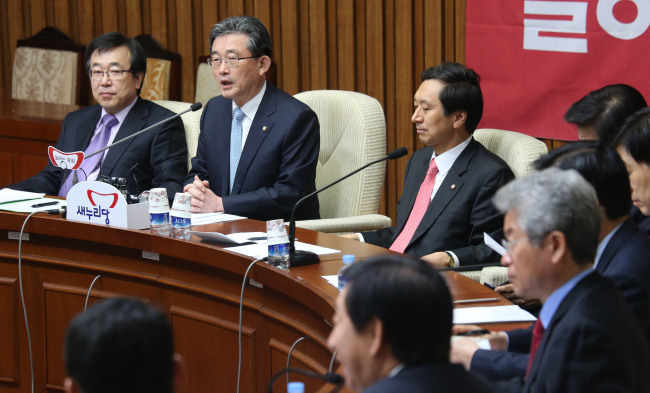박 대통령은 이와 같은 법안 중에 대선공약이 아닌 것도 포함되어 있는데 “무리한 것은 아닌지 걱정이 된다”면서 “여야 간에 주고받는 과정에서 그렇게 된 것 같기는 하다”라고 말했다.
이와 같은 발언은 여야가 대기업의 독과점을 금지하는 방안을 논의하는 과정에서 나왔는데, 야당 측에서는 이에 대해 비판하고 나섰다.
박기춘 민주당 원내대표는 박 대통령이 “(야당의) 초당적 협력이 시작되는 시점에서 청와대가 추경과 경제민주화와 관련, 가이드라인으로 해석되는 발언을 쏟아붓고 있다”고 말했다.
박 원내대표는 “청와대의 브레이크나 가이드라인이 없으면 여야가 원칙을 지키면서 유연하고 빠르게 합의할 수 있다”면서 박 대통령이 국회의 논의를 지원해달라고 말했다.
여야는 최근 대기업들이 독과점을 이용한 불법적인 행위를 하는 것을 막기 위한 규제 방안을 논의해왔다.
이러한 방안 중에는 횡령, 배임액이 300억원 이상인 경우 최소 15년 형 이상의 징역을 선고하는 ‘특정경제범죄 가중처벌 등에 관한 법률(특경가법)’ 개정안과 재벌총수의 배임ㆍ횡령 등 경제인 범죄와 관련해 대통령 특별사면권을 제한하는 방안 등이 포함되어 있다.
또한 내부 거래를 통해 재벌 계열사 간에 일감을 몰아주는 경우 기존보다 강력한 처벌을 하는 내용 역시 논의되고 있다. 이 경우, 일감을 몰아준 기업과 받은 기업 모두 관련 매출의 최대 5%의 과징금을 물리는 방안이 추진되고 있어 재계의 반발이 심한 것으로 알려졌다.
이언주 민주당 원내대변인은 박 대통령의 발언에 대해 “대통령 공약에 포함되어 있지 않은 내용은 국회에서 논의하면 안 된다는 뜻인지 묻고 싶다”며 “대통령의 3권분립 인식에 큰 문제가 있는 듯 하다”고 말했다.
이 원내대변인은 “입법권은 국회에 있다”고 강조하며 박 대통령에게 “입법권에 관련된 사안을 미리 언급해 여당에 압력을 가한다는 오해를 사지 않기를 바란다”고 전했다.
한편 여당 내에서는 박 대통령의 발언에 동조하는 의견이 주를 이루고 있는 것으로 알려졌는데, 새누리당 이한구 원내대표는 이날 확대 원내대책회의에서 “단기적 시각을 갖고 대중 인기에만 영합하는 식의 접근을 하면 경제를 살려내기 어렵다”고 주장했다.
이 원내대표는 이와 같은 규제 논의에 대해 “선거 때에는 이해가 되지만, 아직도 국회에서 대기업 등이 무조건 무슨 문제가 큰 것처럼 보는 시각이 있는 것 같다”며 “기업인들의 의욕을 꺾는 일이 없도록 신경써야 한다”고 말한 바 있다.
그 외에도 비박계 김용태 의원 등 여러 여당 의원은 경제 현실에 맞게 대책을 검토해야 한다고 주장했다.
그러나 일부 새누리당 의원은 이러한 회의론에서 거리를 두는 듯한 모습을 보였다.
새누리당 내 의원모임인 경제민주화실천모임 소속 김세연 의원은 “대기업 독과점 체제가 구축돼 경제적 약자들의 일방적 피해를 강요하는 상황에서 어떻게든 구조적으로 손을 대야 한다”고 주장했다.
김 의원은 이어 “경제 민주화 필요성을 부인하는 듯한 논의가 계속되는 것은 바람직하지 않다”라고 주장했다. (코리아헤럴드)
<관련 영문 기사>
President’s chaebol law criticism riles opposition
By Choi He-suk
President Park Geun-hye’s criticism of parliamentary moves to tighten the reins on conglomerates is fueling new political disputes.
On Monday, Park voiced concerns that a series of measures under discussion at the National Assembly overstepped the goal of her flagship economic democratization policy and could worsen investor sentiment.
Opposition politicians chided her for reversing course on her campaign pledges and infringing upon the National Assembly’s legislative authority.
“It seems to have developed while going back and forth between the ruling and opposition parties, but it is worrisome that (the measures) are going too far,” Park said at Monday’s meeting with presidential staff.
The comment, which came just as lawmakers put forward tougher anti-trust measures, incited criticism from the main opposition Democratic United Party.
“Cheong Wa Dae is issuing guidelines when the parties are trying to cooperate (on economic democratization measures),” DUP floor leader Rep. Park Ki-choon said on Tuesday.
“The ruling and opposition parties can reach an agreement more quickly while upholding principles without Cheong Wa Dae issuing guidelines or applying brakes.”
In recent weeks lawmakers have proposed revising regulations to impose heavier punishments on leaders of large companies involved in illegal activities.
Such measures include imposing jail sentences of between 15 years and life on conglomerate chiefs who make illegal gains of more than 30 billion won ($26.8 million), and revising the Amnesty Act to limit the president’s authority to pardon economic criminals.
Others include levying heavier fines on affiliates of conglomerates involved in anticompetitive in-house dealings.
The DUP also questioned Park’s understanding of the separation of powers.
“(I) want to ask if this means that topics not included in the president’s campaign pledges should not be discussed at the National Assembly. It seems that there is a serious problem in (the president’s) concept of separation of powers,” DUP spokeswoman Rep. Lee Un-ju said.
“The legislative power is with the National Assembly. The president should avoid being misunderstood as putting pressure on the ruling party by mentioning issues related to legislative powers.”
The mainstream of the ruling Saenuri Party, however, supported the president’s comment, with floor leader Lee Hahn-koo again emphasizing that caution was required in related discussions.
“It will be difficult to revive the economy if the National Assembly, which has the authority to decide on important economic policies, approaches the issue with a short-term view to appeal to the public,” Saenuri Party floor leader Rep. Lee Hahn-koo said.
On Monday, Lee had said that while talk of strong economic democratization measures was “understandable during elections,” the parties should “be careful not to break businesspeople’s drive.”
Similar views were echoed by a number of Saenuri Party lawmakers who warned against “excessive legislation.”
However, some Saenuri figures have distanced themselves from such skepticism.
“The structure of this situation where large companies have monopolies forcing disadvantage onto the economically weak must be addressed in some way,” Rep. Kim Se-yeon said. Kim is the executive secretary of the Saenuri Party’s discussion group on economic democratization.
“It is not desirable for discussions that seem to deny the need for economic democratization to continue.”
(
cheesuk@heraldcorp.com)








![[Today’s K-pop] Blackpink’s Jennie, Lisa invited to Coachella as solo acts](http://res.heraldm.com/phpwas/restmb_idxmake.php?idx=644&simg=/content/image/2024/11/21/20241121050099_0.jpg)